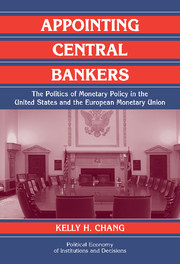 Appointing Central Bankers
Appointing Central Bankers Published online by Cambridge University Press: 05 September 2009
When Clinton nominated Edward Gramlich and Roger Ferguson to the BOG in the fall of 1997, the Senate reaction was notable for its absence. In stark contrast to the critical attack on Rohatyn, the senators barely commented on these nominations except to praise the nominees' “extraordinary backgrounds” (Senator D'Amato, Chairman of the Senate Banking Committee, quoted in Wessel 1997: A10). The hearings were short, and the full Senate voted quickly to appoint Gramlich and Ferguson.
Clinton had learned a great deal from the Rohatyn nomination. He had discovered that Rohatyn was too far on the easy side relative to what the Senate would tolerate. Perhaps even Rivlin was a bit problematic; the Senate's confirmation vote on her appointment was not unanimous – a rare occurrence. Clinton needed to nominate someone like Meyer, who supported the current Fed policy and thus seemed likely to be a future median member of the FOMC. According to this criterion, Gramlich and Ferguson were good choices. At the time of their confirmation hearings, the FOMC was split into two factions; one side expected an imminent inflation rise while the other side claimed the possibility of a golden age with continued low inflation and high growth. In the hearings, Gramlich and Ferguson both staked a middle position with neither taking sides in the FOMC debate. Satisfied with this anticipated choice by Clinton, the Senate approved both the nominees.
To save this book to your Kindle, first ensure [email protected] is added to your Approved Personal Document E-mail List under your Personal Document Settings on the Manage Your Content and Devices page of your Amazon account. Then enter the ‘name’ part of your Kindle email address below. Find out more about saving to your Kindle.
Note you can select to save to either the @free.kindle.com or @kindle.com variations. ‘@free.kindle.com’ emails are free but can only be saved to your device when it is connected to wi-fi. ‘@kindle.com’ emails can be delivered even when you are not connected to wi-fi, but note that service fees apply.
Find out more about the Kindle Personal Document Service.
To save content items to your account, please confirm that you agree to abide by our usage policies. If this is the first time you use this feature, you will be asked to authorise Cambridge Core to connect with your account. Find out more about saving content to Dropbox.
To save content items to your account, please confirm that you agree to abide by our usage policies. If this is the first time you use this feature, you will be asked to authorise Cambridge Core to connect with your account. Find out more about saving content to Google Drive.